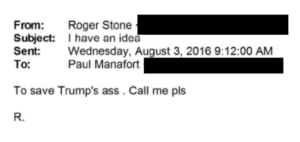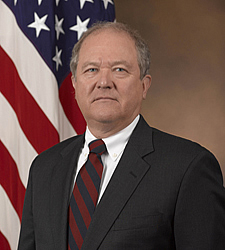But Her Emails: How Trump Trained the GOP to Hate Rule of Law 1
Note: I haven’t quite finished spinning my Ball of Thread out of which I will explain how Trump trained the GOP to hate rule of law. But for a number of reasons — this great Heather Cox Richardson piece marking the Maidan anniversary and Paul Manafort’s role in it, the arrest of Alexander Smirnov in conjunction with a 2020 attempt, assisted by Bill Barr, to frame Joe Biden, and the heightened urgency of the fate of Ukraine — I thought I’d publish this now.
In an alternate reality, the final report laying out how Trump knowingly requested and accepted help — help he may have denied, but which did come from Russia — to win the 2016 election might have started with a nod to these exhibits, submitted in conjunction with Paul Manafort’s guilty plea on September 14, 2018.
The criminal information and exhibits describe Manafort’s efforts to help Viktor Yanukovych neutralize his pro-Western female opponent, Yulia Tymoshenko, first by prosecuting her for corruption, then by launching an increasingly complex transnational influence operation to “plant some stink on Tymo” to justify the prosecution. The exhibits describe how Manafort tried to spin a Skadden Arps report finding that Tymoshenko’s criminal intent “is almost non-existent,” and then how Manafort criminally covered up that effort at spin. There’s even a passage describing how Manafort manufactured a claim that Tymoshenko was antisemitic by getting an Israeli to make a statement to the NYPost.
“Bada bing bada boom,” Manafort bragged about his success in manufacturing a fake election scandal.
It was all an effort, Manafort described, to claim Ukraine was building a “‘rule of law’ democracy” so the EU and US would ignore Yanukovich’s human rights violations.
In that same alternate reality, Manafort would have honored his plea deal, and in the days following Manafort’s September 14 plea, he would have elaborated on the things he told prosecutors in the days leading up to it and some others they likely wanted to know. He might have explained how his Ukrainian backers and probably Konstantin Kilimnik — who a number of people, but not Manafort, admitted might be a Russian spy — seemed to know by December 2015 that Manafort would run Donald Trump’s campaign. Manafort might have revealed more about his meeting with Kilimnik on August 2, 2016, at which he reviewed polling that showed the key to winning was driving up Hillary’s negatives; Manafort might also have explained the relationship between that election discussion and two other topics discussed that night: how he would get paid millions and Kilimnik’s plan to carve up Ukraine for Russia’s benefit. If Manafort had fulfilled his plea deal, he might have explained what his long-time friend Roger Stone pitched to him on August 3, the day after that secret cigar bar meeting, as a way to “save Trump’s ass.”
He might have said more than he otherwise did about how Stone learned, within a few weeks after that August 3 conversation, that WikiLeaks would be dropping emails stolen from John Podesta that would show, Stone hoped, that Hillary’s campaign manager had the same kind of Russian exposures that Manafort did.
Manafort would be vindicated because he had to leave the campaign for being too pro-Russian, and this would show that Podesta also had links to Russia and would have to leave.
None of that happened.
Manafort seems to have decided — perhaps after a conversation his attorney had with Rudy Giuliani around the same day he flipped — to string out Mueller’s prosecutors until after the midterms. After the election Trump fired Jeff Sessions and ultimately replaced him with someone who would shut down the investigation and see to it that Manafort’s imprisonment remained comfortable, and not just comfortable, but amenable to further collusion with Rudy on schemes that would frame Hunter Biden for tax and influence peddling crimes in Ukraine, until such time as Trump could pardon his former campaign manager for tax and influence peddling crimes in Ukraine.
In this alternate reality, then, the story of how Trump taught Republicans to hate rule of law might start with a story of how his campaign manager had spun corruption as rule of law in the past, in Ukraine, and how the 2016 election did something similar in the US.
But then, Republicans didn’t need Paul Manafort’s help to demonize Hillary Clinton. That had been a core focus of the Republican party since her spouse’s presidency. That unrelenting focus on criminalizing the Clintons (and via that narrative, dehumanizing Democrats, thereby heightening polarization) had been nourished over three decades in an increasingly airtight Fox News bubble, one newly challenged by even sloppier, more radical propaganda outlets.
In the years before the election contest with Trump, the right wing propaganda machine manufactured two criminal investigations into Hillary to “plant some stink” on her.
In January 2016 — fifteen years after DOJ first investigated the Clinton Foundation — three different FBI offices opened investigations into the Clinton Foundation based entirely or substantially on Peter Schweizer’s Clinton Cash. Notably. At least one of the FBI agents handling an informant on that investigation was affirmatively pro-Trump. “I saw a lot of scared MFers on … [my way to work] this morning,” one gloated the day after the election. “Start looking for new jobs fellas. Haha.” As NYT first reported, that investigation remained open until after Trump left office.
And by the time Manafort joined Trump’s campaign in March 2016, House Republicans were three years into their endless Benghazi investigations. After years of pushing, that had morphed into the investigation into Hillary’s private server, which would merge right into the public and private pursuit of Hillary’s deleted emails. “Russia, if you’re listening,” Trump begged a hostile country to find those deleted emails for him, even as his ascendant National Security Advisor worked with a Senate staffer to find out of hostile powers had gotten copies.
Details of both investigations into Hillary leaked, with a slew of stories (one, two, three) fed through Devlin Barrett (then still at WSJ) in the days before the election.
Of course it was Jim Comey who did the real damage, first by usurping DOJ’s authority to issue a prosecutorial decision and then planting some stink on Hillary while doing so. That led to a series of congressional hearings, and ultimately to the reopening of the investigation, predictably leaking days before the election.
Among the many but-fors that decided that election, Comey’s actions were easily the most important. Comey did this — made repeated attempts to stave off claims of partisanship — in a naive bid he could convince the hoards chanting “Lock her up!” of the legitimacy of the decision not to charge.
We’ll never know, but that effort, the orchestrated campaign to criminalize Hillary followed by a ham-handed effort to convince right wingers of the legitimacy of a considered prosecutorial decision, by itself, may have been enough to carry Trump to victory.
This, then, was the raw material Russia exploited in 2016 — stoking both sides of a deep partisan divide fueled by two decades of a propaganda focused on criminalizing Hillary Clinton.
The Republicans proved in that election (or reconfirmed the Whitewater test) that if only they repeated allegations often enough, loudly enough, preferably over and over again in Congress, eventually some criminal investigation would result, a criminal investigation that Republicans could then amplify.
The Republicans came to that election with an unshakeable belief that Hillary was a criminal and if DOJ said she wasn’t, there must be something wrong with DOJ, not any shortcomings in the evidentiary case.
And then Russia dropped a match on that already flaming bonfire.



